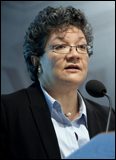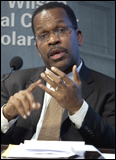National Urban Policy: Is a New Day Dawning?
One of President Obama's first orders of business in office was to create a White House Office of Urban Affairs to coordinate the various agencies working on pieces of urban policies. Mercedes Marquez of the U.S. Department of Housing and Urban Development and experts outside the government takes stock of the efforts to date.
 During the 2008 presidential campaign, then candidate Barack Obama promised a new emphasis on national urban policy if he was elected. One of his first orders of business as president was to sign an executive order creating a White House Office of Urban Affairs to spearhead those new directions and coordinate the efforts of the various departments and agencies having pieces of urban policies and programs. Mercedes Marquez, the Assistant Secretary for Community Planning and Development at the Department of Housing and Urban Development told a Wilson Center seminar audience on January 25 that a new day is indeed dawning in the federal government when it comes to national urban policies. "While I did not see it when I previously served as counsel to the HUD secretary during the Clinton Administration, there is a whole new level of activity both within the department and between departments that is very encouraging."
During the 2008 presidential campaign, then candidate Barack Obama promised a new emphasis on national urban policy if he was elected. One of his first orders of business as president was to sign an executive order creating a White House Office of Urban Affairs to spearhead those new directions and coordinate the efforts of the various departments and agencies having pieces of urban policies and programs. Mercedes Marquez, the Assistant Secretary for Community Planning and Development at the Department of Housing and Urban Development told a Wilson Center seminar audience on January 25 that a new day is indeed dawning in the federal government when it comes to national urban policies. "While I did not see it when I previously served as counsel to the HUD secretary during the Clinton Administration, there is a whole new level of activity both within the department and between departments that is very encouraging."
Marquez described her job and outlook as being "pragmatically aspirational." "Some old ideas are new again. There were things that worked that were discontinued," and other things that were talked about but not tried. "In the last few years," she said, we lost focus on urban areas. "Now with layoffs, furloughs, and a diminished tax base there is great stress at the local level that is palpable." She said some of the most anemic parts of HUD had to do with economic development. According to one study she cited, there is now greater poverty in the suburbs than in inner cities. Meanwhile, some of our cities are reviving. "We need to understand their revival and we need the frame of interdependence between urban and suburban areas." Echoing the president's oft repeated theme, "We need to see our cities as the solution and not the problem," said Marquez. Both the federal government and local governments "need to look at our problems from 30,000 feet in the air and understand how local governments really work, relate to their regions, and affect the every day lives of people in our communities."
HUD is in the process of improving its abilities to assist cities in building their capacities to govern and monitor and evaluate the effectiveness of the Federal programs and the money spent on them. Marquez added that the Federal government had moved away from any earlier era when it thought it could solve all the problems of urban areas to one in which we assumed the local governments know best what to do. Now we are coming into a new balance or partnership with local governments, private enterprise and the philanthropic sector which had helped fill-in as the federal government's role had receded. "We have seen the rise of many visionary and energetic leaders at the state and local levels who have done some wonderful things," she added, "but it has been an uneven process." We need to provide more links between various federal programs (such as Community Development Block Grants and the Choice Neighborhoods program) to assist in this process of economic development that builds sustainable communities.
 Assistant professor Joshua Sapotichne of Michigan State University's political science department took issue with the idea that Federal efforts on urban problems have receded to some backwater. His data on public opinion, media stories, presidential state of the Union messages, and congressional hearings certainly does indicate a drop in national and governmental attention to urban problems generally after 1968. However, there has been shift from space to function resulting in addressing various problems endemic to the cities in a discrete or disaggregated manner, such as drugs and crime, transportation, waste water treatment, and education. This came about not only because of the move to a New Federalism, block grant approach during the presidency of Richard Nixon, but also because cities lost population and congressional representation to the suburbs and talking about urban problems was no longer politically popular given negative associations that flowed from the urban riots of the sixties.
Assistant professor Joshua Sapotichne of Michigan State University's political science department took issue with the idea that Federal efforts on urban problems have receded to some backwater. His data on public opinion, media stories, presidential state of the Union messages, and congressional hearings certainly does indicate a drop in national and governmental attention to urban problems generally after 1968. However, there has been shift from space to function resulting in addressing various problems endemic to the cities in a discrete or disaggregated manner, such as drugs and crime, transportation, waste water treatment, and education. This came about not only because of the move to a New Federalism, block grant approach during the presidency of Richard Nixon, but also because cities lost population and congressional representation to the suburbs and talking about urban problems was no longer politically popular given negative associations that flowed from the urban riots of the sixties.
For those same reasons, Sapotichne argued, it would be difficult to successfully revive a renewed emphasis on urban policies, as much as the president may wish to do so. However, as Sapotichne pointed out in his paper, the economic recovery and reinvestment (or stimulus) bill enacted this year has poured billions of new dollars into the cities for all manner of programs relating to infrastructure, green jobs and training for retrofitting buildings, and mass transit. Because stimulus funds went out to all regions of the country, there was not the outcry against them there might have been if they had only been spent in high density areas.
 William Barnes, emerging issues director for the National League of Cities, stood by an article he wrote five years ago on the 40th anniversary of the creation of the Department of Housing and Urban Development, that, "The era of federal urban policy is, like, way over." Barnes cited many of the same reasons as Sapotichne for lessened political attention to trying to forge an overarching urban strategy, namely that since the first urban riots in L.A. in 1965, cities have been characterized in the public mind by "plight, fright and flight." As skeptical as he is about a new direction, Barnes said he hoped if a new assessment is indeed underway, those responsible would first engage in a rethinking and rebuilding of the architecture for urban problem solving. So much has changed in the last 45 years that we are not looking at the same urban landscape or set of problems.
William Barnes, emerging issues director for the National League of Cities, stood by an article he wrote five years ago on the 40th anniversary of the creation of the Department of Housing and Urban Development, that, "The era of federal urban policy is, like, way over." Barnes cited many of the same reasons as Sapotichne for lessened political attention to trying to forge an overarching urban strategy, namely that since the first urban riots in L.A. in 1965, cities have been characterized in the public mind by "plight, fright and flight." As skeptical as he is about a new direction, Barnes said he hoped if a new assessment is indeed underway, those responsible would first engage in a rethinking and rebuilding of the architecture for urban problem solving. So much has changed in the last 45 years that we are not looking at the same urban landscape or set of problems.
 Michael Fletcher, who reports on the Obama Administration for the Washington Post, concurred with the others that forging a new urban policy is not politically doable simply because the term is so closely tied to race and could result in political blowback. Nevertheless, he said, President Obama is "doing the more to help urban areas than any president in recent times;" he's just not directly calling it a new urban policy. His health care reforms, if enacted, said Fletcher, "would be a great benefit to working families and the urban landscape." Job training for weatherization and new mass transit funding are other areas Fletcher cited in the recovery act that help the cities.
Michael Fletcher, who reports on the Obama Administration for the Washington Post, concurred with the others that forging a new urban policy is not politically doable simply because the term is so closely tied to race and could result in political blowback. Nevertheless, he said, President Obama is "doing the more to help urban areas than any president in recent times;" he's just not directly calling it a new urban policy. His health care reforms, if enacted, said Fletcher, "would be a great benefit to working families and the urban landscape." Job training for weatherization and new mass transit funding are other areas Fletcher cited in the recovery act that help the cities.
The main question left hanging by the panel, including HUD Assistant Secretary Marquez, is how the president will pay for new urban initiatives that will be unveiled in his budget and state of the Union messages if he is serious about a three-year domestic spending freeze.
By Don Wolfensberger, Director, Congress Project